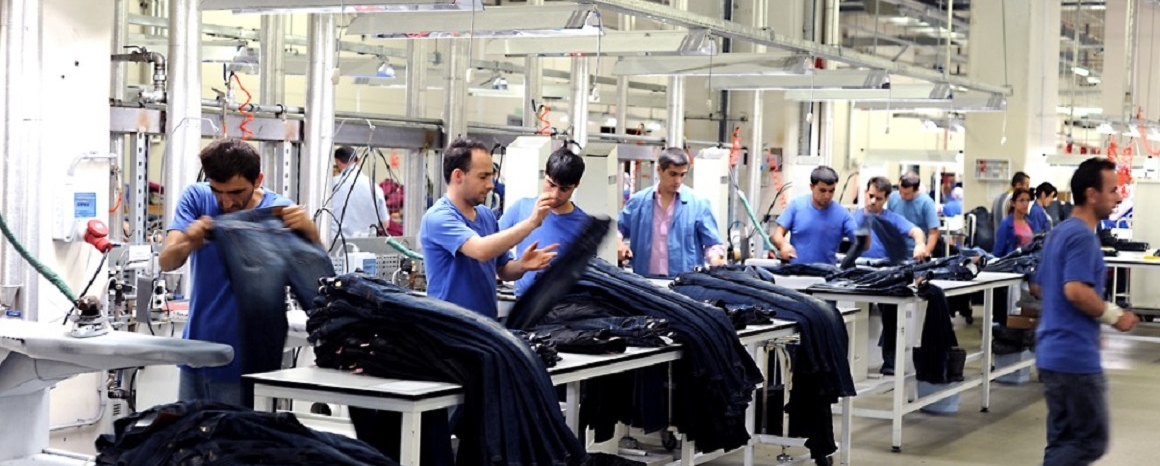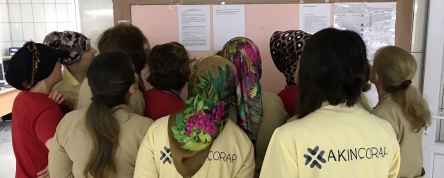Turkey has seen an influx of almost three million Syrian refugees. With few legal opportunities to earn money, many seek work in Turkey’s ‘informal’ garment sector. Here, refugees – including children – can be subject to poor working conditions and very low wages.
Turkey’s apparel, textiles and leather industries
Turkey’s popularity as an international sourcing destination has grown due to its ability to produce high-quality products quickly. It is now the third largest exporter of garments and leather goods to Europe after Bangladesh and China.
However, it is an industry with a large, unregulated sector. Traditionally, workers have also faced many difficulties. These include long working hours, poor wages and gender discrimination.
7% The sector’s share of Turkey’s GDP.
US$12 billion The sector’s export value to Turkey.
1.04 million Number of registered workers in the regulated sector.
1 million Estimated number of workers thought to be working informally, of whom an increasing number are Syrian refugees.
Why we are working in Turkey
The mass movement of Syrian refugees into Turkey – and their participation in the labour market – has made endemic problems worse.
In late 2014, member brands approached ETI expressing concerns about issues they were seeing in their Turkish supply chains arising from the illegal employment of Syrian refugees. They asked for our assistance in addressing this.
As responsible businesses, ETI members wanted to see an end to exploitation and to maintain their sourcing operations in Turkey.
Following detailed discussions, and in collaboration with the Fair Labor Association, we convened a meeting in March 2015 in Istanbul to agree a roadmap for action.
The meeting included companies, global and local trade unions and NGOs, UN agencies including the ILO, UNHCR and IOM and representatives of Turkey’s Ministry of Labour.
How we are tackling poor employment practices
Initially, we lobbied the Turkish authorities to allow refugees work permits. This was legislated in January 2016. With company funding, we also published guidance for refugees on their employment rights and sponsored a Ministry of Labour communications campaign.
Yet significant concerns remain. So far, take up of work permits has been slow, for example. This is thought to be due to application restrictions and registration issues. Consequently, child labour and illegal working remain serious issues.
Now, with funding from the UK’s Foreign and Commonwealth Office and companies, we have put in place a 3-year programme. The aim is to embed reform and encourage better employment conditions for both Syrian and Turkish workers.
Specifically, company members agree to:
- Develop internal policies.
- Enhance their audit procedures in the first and second tiers of their supply chains – and many are now doing more.
- Put in place effective remediation where unregistered Syrian workers are found to be employed.
More broadly, we are helping to establish a local Business and Human Rights Platform. This will create a space for local stakeholders to discuss ways forward and develop a multi-tiered action plan for tackling issues.
Simultaneously, we will be developing business and human rights due diligence resources to give brands and retailers more guidance.
We will also be adapting ETI workplace social dialogue models on worker/management relations for piloting in Turkey. Additionally, will support the development of better grievance mechanisms.
Achievements
Since it was formally established in November 2016 the Business and Human Rights Platform has seen strong levels of engagement from across Turkey’s garments industry. It is supported by 29 brands, IndustriALL Global Union and its local affiliates, the Istanbul exporters association (ITKIB), the clothing manufacturers association (TGSD) and the textile manufacturers association (TTSIS) – as well as civil society organisations.
Recent surveys conducted by the Business and Human Rights Resource Centre (BHRRC) show that ETI member brands have significantly improved their policies and practices. Additionally, our own consultations with suppliers show a high level of awareness, with suppliers talking knowledgeably about the challenges of applying for work permits for Syrian refugees, while trade associations and industry bodies are fostering active links with government ministries with responsibility for the refugee crisis.
Not only that, in partnership with ITKIB, the UN’s Refugee Agency (UNHCR) and the International Middle East Peace Research Centre, we have trained 178 suppliers on the employment of Syrian refugees in line with a “law and decent work” agenda. We have also developed a model of workplace social dialogue to support better discussion between workers and management on workplace issues, which is currently being piloted in five factories.
From our blog
As part of our wider outreach we blog regularly on issues on the news agenda offering opinion and comment. Scroll through our blog pages here.
Turkey programme group members
Non ETI members are welcome to engage with the programme group and currently 26 companies are members in addition to trade unions and NGOs.
Brands
Trade Unions and NGOs
ASDA, ASOS, Boden, Bonmarche, Burberry, C&A, Debenhams, Fatface, H&M, Hobbs, Inditex, John Lewis Partnership, Mayoral, M&S, Monsoon, Mothercare, N Brown Group, New Look, Next, Orsay, Primark, Shop Direct, SuperGroup, Tchibo, Tesco, White Company, Whistles, ZLabels.
IndustriALL & Affiliates (Teksif, Oz-Ipklis, Deri-Teks, DISK-Tekstil)
CARE International, Oxfam GB as well as local women’s rights and refugee rights organisations
ETI contact
Hannah Bruce, Head of Global Partnerships


